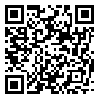Volume 10, Issue 1 (Spring 2024)
JMIS 2024, 10(1): 16-31 |
Back to browse issues page
Download citation:
BibTeX | RIS | EndNote | Medlars | ProCite | Reference Manager | RefWorks
Send citation to:



BibTeX | RIS | EndNote | Medlars | ProCite | Reference Manager | RefWorks
Send citation to:
Sedghi S, Akbari Z, Soleymanpour S. Evaluation of the Graduate Students' Moral Literacy in the Social Networks at Iran University of Medical Sciences. JMIS 2024; 10 (1) :16-31
URL: http://jmis.hums.ac.ir/article-1-461-en.html
URL: http://jmis.hums.ac.ir/article-1-461-en.html
Department of Medical Library and Information Science, School of Health Management and Information Sciences, Iran University of Medical Sciences, Tehran, Iran.
Abstract: (2740 Views)
Objective: Morality has a main role of the survival of societies. Paying attention to this important principle and trying to educate and institutionalize it in societies seems necessary. This study aimed to evaluate the graduate students' moral literacy in the social networks at Iran University of Medical Sciences.
Methods: This is a descriptive survey study with a cross-sectional design. The study population of the study included all MSc. and PhD. students of the Iran University Medical Sciences in all disciplines during the academic year of 2019-2020. We used Krejcie’s and Morgan’s sampling methods to calculate the sample size, and the calculated sample size was 327. The data collected was a researcher-mad questionnaire that validity of the questionnaire was assessed by the professors of the Department of Library and Medical Information Sciences (n=5), and its reliability was estimated using Cronbach’s α test (0.818). data analysis using SPSS sofware, version 24, through descriptive statistics methods such as mean, frequency percentage, frequency distribution, and standard deviation Furthermore, we used the one-sample t-test in the inferential statistics.
Results: The findings indicated mean of moral literacy (3.58) was above hypothetical average as well as the mean of its investigatesd components, moral sensitivity (3.75), moral reasoning (3.64) and moral imagination (3.36) was above average.
Conclusion: Graduate students tend to acquire moral literacy and becoming more awareness of ethical principles in social networks and this itself facilitates the process of learning.
Methods: This is a descriptive survey study with a cross-sectional design. The study population of the study included all MSc. and PhD. students of the Iran University Medical Sciences in all disciplines during the academic year of 2019-2020. We used Krejcie’s and Morgan’s sampling methods to calculate the sample size, and the calculated sample size was 327. The data collected was a researcher-mad questionnaire that validity of the questionnaire was assessed by the professors of the Department of Library and Medical Information Sciences (n=5), and its reliability was estimated using Cronbach’s α test (0.818). data analysis using SPSS sofware, version 24, through descriptive statistics methods such as mean, frequency percentage, frequency distribution, and standard deviation Furthermore, we used the one-sample t-test in the inferential statistics.
Results: The findings indicated mean of moral literacy (3.58) was above hypothetical average as well as the mean of its investigatesd components, moral sensitivity (3.75), moral reasoning (3.64) and moral imagination (3.36) was above average.
Conclusion: Graduate students tend to acquire moral literacy and becoming more awareness of ethical principles in social networks and this itself facilitates the process of learning.
Type of Study: Research |
Subject:
Special
Received: 2023/05/19 | Accepted: 2023/10/7 | Published: 2024/04/1
Received: 2023/05/19 | Accepted: 2023/10/7 | Published: 2024/04/1
Send email to the article author
| Rights and permissions | |
 |
This work is licensed under a Creative Commons Attribution-NonCommercial 4.0 International License. |








 hums.ac.ir
hums.ac.ir